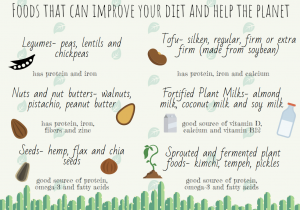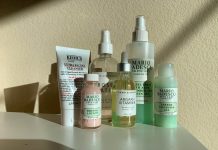By Ainsley Davis

From Starbucks offering almond milk to all the new vegetarian and vegan restaurants popping up, it’s easier and more common than ever to ditch meat and dairy. Serena Williams, Ellen Degeneres, and Liam Hemsworth are only some of the major celebrities to embrace the vegan lifestyle, and health experts endorse the benefits of a plant-based diet. However you don’t have to go fully vegan or even vegetarian to help the environment and live a healthier lifestyle.
“I wouldn’t become vegetarian or vegan because I like meat too much, but I give big props to people who can devote themselves to that,” sophomore Michelle Mayers said.
According to Johns Hopkins University, the way meat and dairy is produced can have harmful effects. Most of these products come from factory farms, enormous facilities that squeeze hundreds of animals into small spaces where disease spreads easily. They produce 369 million tons of waste annually which is dumped into the environment, and becomes a health risk for humans and wildlife. Cows produce harmful methane gases, and since so many are being bred, these gases contribute to climate change. Additionally, livestock and the plants they are fed use up trillions of tons of water.
“The cotton used for clothes, the food grown for cows and chickens, and the cows and chickens themselves need trillions of gallons of water to be produced annually,” senior Jennifer Haber said. “We could be using that water to help impoverished people.”
Eating meat, particularly the processed kind, has been linked to heart disease, type two diabetes, obesity, lung, liver, and colon cancer. Although animal products can be a good source of protein and iron, most Americans eat more than the 1.8-3.5 ounces recommended by doctors. While animal products are not necessarily unhealthy, eating too much of them can be detrimental and it leaves less room in your diet for fruits, veggies, and other nutritious plant-based foods.
Veganism and vegetarianism can work well for some, but others cannot entirely cut animal products from their diets. Many people have allergies or sensitivities and already have restricted diets. Others simply do not have time to plan such a big lifestyle change. For teenagers who rely on the food their parents buy, it can be difficult to make the switch, and some parents don’t allow their kids to eat differently from the rest of the family.
There are a few different philosophies about reducing meat consumption; “Paris Vegans” eat vegan at home and vegetarian when at restaurants. The VB6 Cookbook by Mark Bittman preaches eating vegan for every meal except dinner. Some people try “Meatless Mondays” and go vegetarian for one day a week. Meghan Markle calls herself a “part time vegan” because she eats vegan during the week and is flexible with her diet on the weekends.
“I started with veganism about a year and a half ago, and switched to vegetarian,” senior Kara Aurthorholtz said. “I started eating fish recently for the extra protein and omega fatty acids, since I found myself relying on a lot of carb-heavy foods as a vegetarian.”
Despite the environmental and health benefits of eating more plants, going “veg” does not guarantee perfect health. Although vegetarians tend to have lower blood pressure, BMI, and risk of cancer and heart disease, some experts argue that this is not solely thanks to their diets; vegetarians tend to have other healthy habits such as exercising regularly and avoiding smoking and excessively drinking. Food is not healthy simply because it’s vegetarian; french fries, soda, ice cream, and cinnamon rolls are all meat-free, after all.
“When I started being vegetarian, I didn’t really know what I was doing and I developed an iron deficiency,” senior Maddie Haag said. “My hair was falling out and I was dizzy a lot. Once I actually started tracking my nutrients and getting what I needed, I definitely felt healthier.”
The key to successfully reducing your consumption of animal products is proper planning. According to Harvard University, Calcium, Vitamins D and K, Vitamin B12, Iron and Zinc, and Omega-3 fatty acids are the most important nutrients for vegetarians and vegans. Most of these important nutrients can be found in plant foods, but taking supplements or multi-vitamins can make it easier to stay healthy. Doing research is vital: read about the benefits and pitfalls of any new diet and learn what kinds of meat free-dishes to cook. Whether you choose to go vegetarian, vegan, or simply try to reduce your consumption of animal products, take pride in what you do. All effort, no matter how small, helps create a healthier planet and a healthier you.











